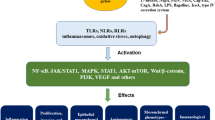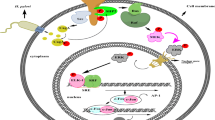Abstract
In recent years there has been much progress in understanding the pathogenesis of gastric cancer. The role of individual factors in gastric carcinogenesis continues to be debated and is also subject to further analysis. In addition to the activation of oncogenes and the inactivation of tumor suppressor genes, alteration of adhesion molecules seems to be critical for the development of gastric cancer.Helicobacter pylori has been linked to an increased risk of developing gastric cancer, and the molecular changes induced byH. pylori are currently being investigated. Recent studies indicate thatH. pylori induces cell proliferation and apoptosis during the early phase of chronic inflammation of the gastric mucosa, whereas in the malignant transformation of the gastric mucosa apoptosis is inhibited and adhesion of gastric epithelial cells is impaired. This review focuses on the role ofH. pylori in the development of molecular changes in gastric cancer and its preneoplastic lesions.
Similar content being viewed by others
References
Wright PA, Williams GT. Molecular biology and gastric carcinoma. Gut 1993;34:145–7.
IARC Working Group on the Evaluation of Carcinogenic Risks to Humans.Helicobacter pylori. In: Schistosomes, liver flukes andHelicobacter pylori: views and expert opinions of an IARC working group on the evaluation of carcinogenic risks to humans. Lyon: IARC, 1994. p. 177–240.
Nomura AMY, Stemmerman GN, Chyou P, Kato I, Perez-Perez GI, Blaser MJ. Helicobacter pylori infection and gastric carcinoma in a population of Japanese-Americans in Hawaii. N Engl J Med 1991;325:1132–6.
Danesh J.Helicobacter pylori infection and gastric cancer: systematic review of the epidemiological studies. Aliment Pharmacol Ther 1999;13:851–6.
Eurogast Study Group. An international association betweenHelicobacter pylori infection and gastric cancer. Lancet 1993;341: 1359–62.
Correa P. Human gastric carcinogenesis: a multistep and multifactorial process: first American Cancer Society award lecture on cancer epidemiology and prevention. Cancer Res 1992;52:6735–40.
Dixon MF. Atrophy, metaplasia, and dysplasia: a risk for gastric cancer: are they reversible? In: Hunt RH, Tytgat GNJ, editors.Helicobacter pylori; basic mechanisms to clinical cure 1998. Dordrecht: Kluwer, 1998. p. 336–53.
Miehlke S, Hackelsberger A, Meining A, von Arnim U, Müller P, Ochsenkühn T, et al. Histological diagnosis ofHelicobacter pylori gastritis is predictive of a high risk of gastric carcinoma. Int J Cancer 1997;73:837–9.
Meining A, Bayerdörffer E, Müller P, Miehlke S, Lehn N, Hölzel D, et al. Gastric carcinoma risk index in patients infected withHelicobacter pylori. Virchows Arch 1998;432:311–4.
Miehlke S, Kirsch C, Agha-Amiri K, Günther T, Lehn N, Malfertheiner P, et al. TheHelicobacter pylori vacA s1, m1 genotype and cagA is associated with gastric carcinoma in Germany. Int J Cancer 2000;87:322–7.
Mizutani T, Onda M, Tokunga A, Yamanaka N, Sugisaki Y. Relationship of c-erbB2 protein expression and gene amplification to invasion and metastasis in human gastric cancer. Cancer 1993;72:2083–8.
Park JB, Rhim JS, Park SC, Kimm SW, Kraus MH. Amplification, overexpression and rearrangement of the c-erbB2 protooncogene in primary human stomach carcinomas. Cancer Res 1989;49:6605–9.
Cadena DL, Gill GN. Receptor tyrosine kinases. FASEB J 1992;6:2332–7.
Fujida K, Ohuchi N, Yao T, Okumura M, Fukushima Y, Kanakura Y, et al. Frequent overexpressin, but not activation by point mutation of ras genes in primary human gastric cancers. Gastroenterology 1987;93:1339–45.
Soman NR, Wogan GN, Rhim JS. TPR-MET oncogenic rearrangement: detection by polymerase chain reaction amplification of the transcript and expression in human tumor cell lines. Proc Natl Acad Sci USA 1990:87:738–42.
Yu J, Miehlke S, Ebert M, Hoffmann J, Breidert M, Starzynska T, et al. Frequency of the TPR-MET rearrangement in gastric cancer and in a first degree relative. Cancer 2000:88:1801–6.
Ranzani GN, Luinetti O, Padovan LS, Calistri D, Renault B, Burrel M, et al. p53 gene mutations and protein nuclear accumulation are early events in intestinal type gastric cancer but late events in diffuse type. Cancer Epidemiol Biomarkers Prev 1995;4: 223–31.
Hsieh LL, Huang YC. Loss of heterozygosity of APC/MCC gene in differentiated and undifferentiated gastric carcinoma in Taiwan. Cancer Lett 1995;96:169–74.
Jawhari A, Farthing M, Pignatelli M. The importance of the Ecadherin-catenin complex in the maintenance of intestinal epithelial homoeostasis: more than intercellular glue? Gut 1997;41: 581–4.
Becker KF, Atkinson MJ, Reich U, Becker I, Nekarda H, Siewert JR, et al. E-cadherin gene mutations provide clues to diffuse type gastric carcinomas. Cancer Res 1994;54:3845–52.
Jawhari A, Jordan S, Poole S, Browne P, Pignatelli M, Farthing MJG. Abnormal immunoreactivity of the E-cadherin-catenin complex in gastric carcinoma: relationship with patient survival. Gastroenterology 1997;112:46–54.
Park WS, Oh RR, Park JY. Frequent somatic mutations of the βcatenin gene in intestinal type gastric cancer. Cancer Res 1999; 59:4257–60.
Kinzler KW, Vogelstein B. Lessons from hereditary colorectal cancer. Cell 1996;87:159–70.
Ottini L, Palli D, Falchetti M, D’Amico C, Amorosi A, Saieva C, et al. Microsatellite instability in gastric cancer is associated with tumor location and family history in a high-risk population from Tuscany. Cancer Res 1997;57:4523–9.
Yamamoto H, Perez-Piteira J, Yoshida T, Terada M, Itoh F, Imai K, et al. Gastric cancers of the microsatellite mutator phenotype display characteristic genetic and clinical features. Gastroenterology 1999;116:1348–57.
Zanghieri G, Di Gregorio C, Sacchetti C, Fante R, Sassatelli R, Cannizzo G, et al. Familial occurrence of gastric cancer and in the 2-year experience of a population-based registry. Cancer 1990;66: 2047–51.
Ebert M, Yu J, Miehlke S, Lendeckel U, Ridwelski K, Stolte M, et al. Expression of transforming growth factor beta 1 in gastric cancer and in the gastric mucosa of first degree relatives of patients with gastric cancer. Br J Cancer 2000;82:1795–800.
Yu J, Ebert M, Miehlke S, Lendeckel U, Stolte M, Malfertheiner P, et al. α-Catenin expression is decreased in gastric cancer and in the gastric mucosa of first degree relatives of patients with gastric cancer. Gut 2000;46:639–44.
Watanabe T, Tada M, Nagai H, Sasaki S, Nakao M.Helicobacter pylori infection induces gastric cancer in mongolian gerbils. Gastroenterology 1998;115:642–8.
Honda S, Fujioka T, Tokieda M, Satoh R, Nishizono A, Nasu M. Development ofHelicobacter pylori induced gastric carcinoma in mongolian gerbils. Cancer Res 1998;58:4225–9.
Fan XG, Kelleher D, Fan XJ, Xia HX, Keeling PWN.Helicobacter pylori increases proliferation of gastric epithelial cells. Gut 1996;38:19–22.
Shirin H, Sordillo EM, Oh SH, Yamamoto H, Delohery T, Weinstein IB, et al.Helicobacter pylori inhibits the G1 to S transition in AGS gastric epithelial cells. Cancer Res 1999;59:2277–81.
Terres AM, Pajares JM, O’Toole D, Ahern S, Kelleher D.Helicobacter pylori is associated with downregulation of Ecadherin, a molecule involved in epithelial cell adhesion and proliferation control. J Clin Pathol 1998;51:410–2.
Wu MS, Shun CT, Wang HP, Sheu JC, Lee WJ, Wang TH, et al. Genetic alterations in gastric cancer: relation to histological subtypes, tumor stage, andHelicobacter pylori infection. Gastroenterology 1997;112:1457–65.
Blok P, Craanen ME, Offerhaus GJ, Dekker W, Kuipers EJ, Meuwissen SG, et al. Molecular alterations in early gastric carcinomas: no apparent correlation withHelicobacter pylori status. Am J Clin Pathol 1999;111:241–7.
Blok P, Craanen ME, Offerhaus GJA, Tytgat GNJ. Gastric carcinoma: clinical, pathogenic and molecular aspects, Q J Med 199790:735–49.
Rugge M, Shiao YH, Correa P, Baffa R, Dimario F. Immunhistochemical evidence of p53 overexpression in gastric epithelial dysplasia. Cancer Epidemiol Biomarkers Prev 1992;1:551–4.
Author information
Authors and Affiliations
Rights and permissions
About this article
Cite this article
Ebert, M.P.A., Schandl, L. & Malfertheiner, P. Helicobacter pylori infection and molecular changes in gastric carcinogenesis. J Gastroenterol 37 (Suppl 13), 45–49 (2002). https://doi.org/10.1007/BF02990099
Issue Date:
DOI: https://doi.org/10.1007/BF02990099




